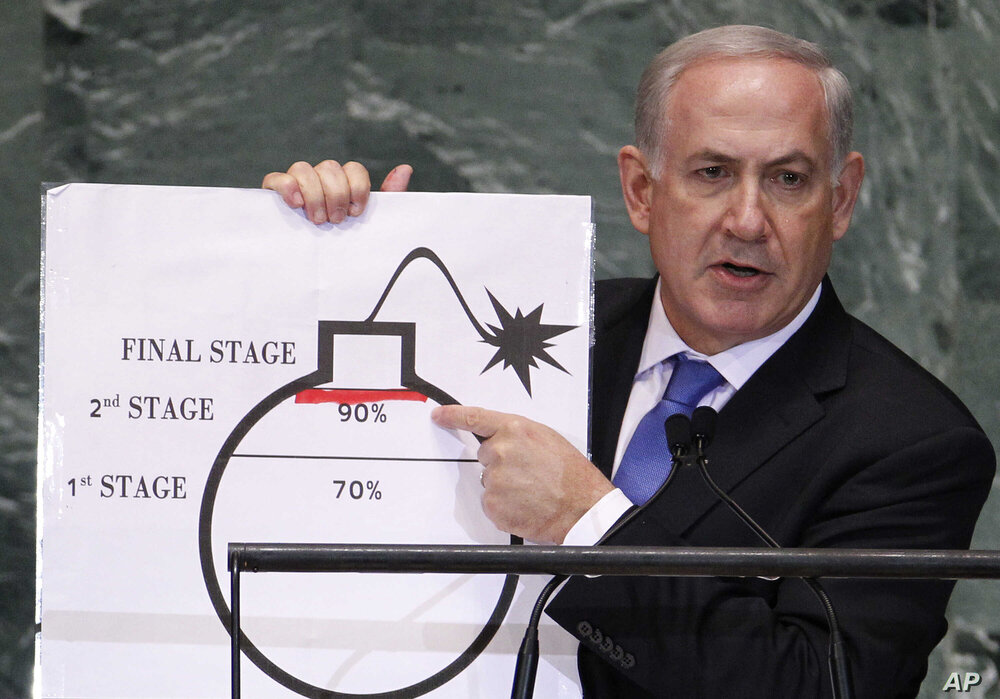Naftali Bennett acknowledges Netanyahu’s attitude towards Iran as embarrassing

TEHRAN - The cabinet of Naftali Bennett, the new Prime Minister of the Israeli regime, has acknowledged the fruitlessness of the former prime minister's propaganda charades against Iran in his speeches to the UN General Assembly.
According to Israeli media reports, Bennett is scheduled to address the 76th session of the UN General Assembly for the first time next Monday.
In the past 12 years, Benjamin Netanyahu has spoken ten times in the UN General Assembly on behalf of the Israeli regime, each time presenting often ridiculed propaganda shows, claiming that Iran would soon acquire a nuclear weapon.
For example, in his 2012 speech, he claimed that Iran would soon have such a weapon by presenting a drawing of an atomic bomb. In his 2020 speech, he also showed images that he claimed were satellite images of a Hezbollah arsenal in Lebanon.
According to western news media, on the eve of Naftali Bennett's visit to New York, Mossad and Israeli military intelligence officials asked him if he intended to provide information about Hezbollah or Iran in a General Assembly speech. However, Bennett's aides said they did not want to use “visual aids, poster boards, drawings, and the like.”
However, according to some Israeli media, like Netanyahu, much of Naftali Bennett's speech would focus on Iran.
Although Naftali Bennett and former Israeli Prime Minister Benjamin Netanyahu are both considered radical extremist politicians toward Iran, the Israeli media claim Bennett intends to steer Tel Aviv's policies in a new direction.
The Israeli regime is the only possessor of nuclear weapons in the West Asian region. With U.S. support, it has kept its nuclear weapons program out of international control. Western countries, led by the United States and the Israeli regime, have accused Iran of pursuing military goals in its nuclear program in recent years. Iran has denied these allegations.
Iran emphasizes that as a signatory to the Nuclear Non-Proliferation Treaty (NPT) and a member of the International Atomic Energy Agency, it has the right to acquire nuclear technology for peaceful purposes.
In addition, International Atomic Energy Agency (IAEA) inspectors have visited Iran's nuclear facilities several times. However, they have never found any evidence that the country's peaceful nuclear energy program deviates from military purposes.
In addition, in 2015, Iran reached an agreement (JCPOA) with P5 + 1 countries to resolve tensions over its nuclear program. Despite the International Atomic Energy Agency's acknowledgment of Iran's adherence to all of its obligations, the U.S. unilaterally withdrew from the agreement in May 2016.
On the other hand, the Israeli regime is the only possessor of nuclear weapons in the West Asian region. With U.S. support, it has kept its nuclear weapons program out of international control.
The new U.S. administration claims that it intends to return the U.S. to the JCPOA but has refused to fulfill its obligations in this regard.
The Israeli regime and Washington have put cooperation against Iran on their agenda in recent months. Reuters reported two months ago that Israel's new cabinet intends to send a group of sanctions experts to Washington to discuss ways to implement better the Joint Comprehensive Plan of Action (JCPOA) and the sanctions regime against Iran.
The Western media clarified that this strategy is very different from "Benjamin Netanyahu" policy, the former Prime Minister of the Israeli regime, who did not intend to cooperate fully with the Biden establishment regarding the return of the United States to the JCPOA.
On July 3, Axios reported, quoting Israeli officials, that Tel Aviv intended to use diplomacy to influence the U.S. government's approach regarding Iran's nuclear program.
Although Naftali Bennett and his cabinet, like Netanyahu, oppose a nuclear deal with Iran, Axios writes that engagement with the United States on the issue is on Bennett's agenda.
On September 22, Axios reported that the U.S. and the Israeli regime had held a secret meeting about JCPOA in recent days.
According to the report, the meeting was held in a secret video conference chaired by White House National Security Adviser Jake Sullivan and head of the Israeli regime National Security Council Eyal Hulata. The meeting was to discuss an alternative U.S. plan if Iran does not return to the JCPOA talks.
A senior Israeli official told Axios that the United States intends to impose new sanctions on Iran if the Vienna talks on the UN Security Council do not resume.
Former Israeli Prime Minister Benjamin Netanyahu made many attempts to overthrow JCPOA when he was in power, including urging former U.S. President Donald Trump to step down from the deal. He has repeatedly stressed that Trump, with his encouragement, left the JCPOA and pursued a "maximum pressure" policy against Iran.
Trump and Netanyahu hoped that maximum pressure could persuade Iran to come to the table to discuss a new agreement instead of JCPOA. This policy failed.
Trump stepped down on January 20 this year, failing to achieve his anti-Iranian goals. In addition, he has been widely criticized in the U.S. for not having a strategy for Iran, fomenting tensions with Iran, and advancing Iran's nuclear program during his four years in the White House.
Joe Biden government officials have repeatedly acknowledged the failure of the "maximum pressure" policy, saying they intend to bring the United States back to JCPOA but have so far refused to take the necessary steps to return to the agreement.
